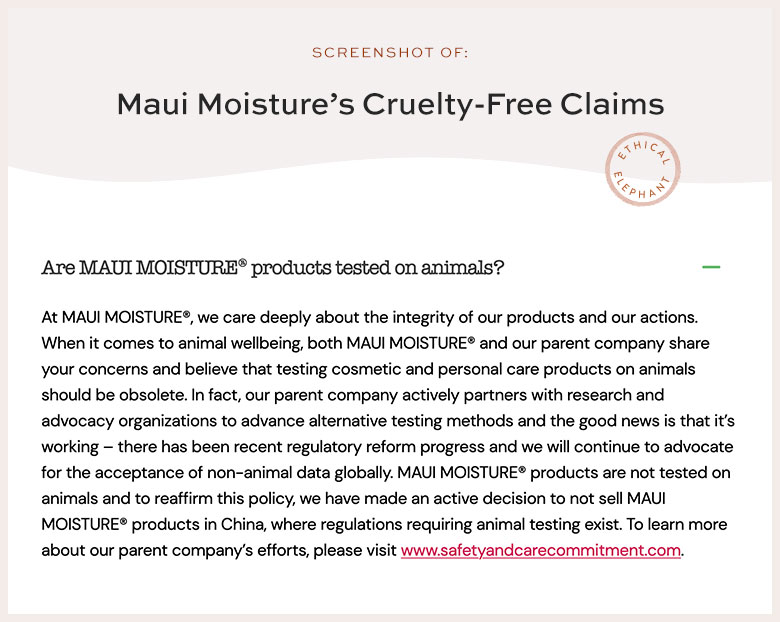In an era where ethical considerations have taken forefront in consumer choices, the beauty industry is undergoing a significant transformation. One brand that captures attention is Maui Moisture. With its vibrant packaging and tropical branding, it invites curiosity not just for its exotic appeal but also for the principles upon which it stands. Central to this intrigue is the pressing question: Is Maui Moisture truly cruelty-free and vegan-friendly?
At the outset, it is pivotal to define what it means for a product to be cruelty-free. The term generally indicates that the product and its ingredients have not been tested on animals at any stage of development. Moreover, vegan-friendly signifies that the formulation contains no animal-derived ingredients—thus adhering to a principle that resonates with many consumers who are conscientious about animal welfare and environmental sustainability.
Maui Moisture, renowned for its hydrating formulas and tropical scent profiles, boldly claims to be cruelty-free. This assertion is not merely a marketing gimmick; it reflects a commitment to ethical practices that resonate with animal rights advocates. However, true adherence to cruelty-free standards requires deconstructing various layers of the beauty supply chain. While the brand itself declares that it does not test on animals, the nuances of ingredient sourcing and country-specific regulations loom large.
Many consumers might presume that a cruelty-free label guarantees a transparent supply chain. Yet, the reality is more complex. Some ingredients might be derived from suppliers who conduct animal testing, whether for safety assessments or regulatory compliance, particularly in markets where animal testing is mandated by law. Although Maui Moisture maintains a stance against animal testing for its products, potential consumers are encouraged to investigate the broader context before making purchasing decisions. Understanding the origins and sourcing of ingredients sheds light on the brand’s true commitment to animal welfare.
As we navigate further into the Vegan aspect of Maui Moisture, the company outlines that it abides by the vegan ethos: The products do not contain any animal-derived substances like honey, milk, or lanolin. This marks a significant step towards a fully plant-based approach in cosmetics, where ingredients such as aloe vera, coconut oils, and hibiscus extracts take center stage. This not only caters to a vegan lifestyle but also signifies an overarching movement in the industry to source natural and sustainable materials that are devoid of animal exploitation.
Among the most alluring aspects of Maui Moisture is its emphasis on natural ingredients. The formulations are designed to hydrate and nourish the hair and skin, leveraging the benefits of flora that thrive in lush environments. The inclusion of ingredients sourced from places like Hawaii accentuates a narrative of wellness and vitality, invoking a sense of connection to natural beauty. Indeed, the tropical allure of Maui Moisture captures attention not only for its sensory experience but also for the ethical commitments behind it.
However, the fascination with Maui Moisture goes beyond its ethical considerations. It taps into the growing zeitgeist that shapes contemporary beauty standards, where consumers seek authenticity in products they use daily. This desire to align one’s personal ethics with purchasing behavior has led to a more informed consumer base. As such, individuals gravitate towards brands that reflect their values—especially those pertaining to veganism and animal welfare. Maui Moisture’s marketing strategy appears to cater to this evolving landscape, positioning itself as a brand that resonates with the ethical consumer.
Furthermore, the idea of cruelty-free and vegan products in the beauty industry signifies more than just consumer trends; it embodies a broader societal shift towards compassion and mindfulness. Individuals are becoming more aware of the consequences of their choices, not only for their health but for the planet and its inhabitants. This awareness fosters a deeper connection between consumers and brands, as the latter hold the power to inspire positive change through their practices.
Nevertheless, skepticism can arise. Consumers might question whether the wave of cruelty-free and vegan branding is merely a marketing ploy, a term that has become fashionable to lure in eco-conscious shoppers. Transparency is indispensable in such discussions. Brands like Maui Moisture must navigate this precarious balance between commercialization and authenticity. Peer reviews, third-party certifications, and transparent communication become vital tools for establishing trust with consumers who wish to support ethical practices.
As the conversation around animal cruelty and environmental sustainability burgeons, it is essential that consumers remain vigilant and well-informed. By doing so, they can advocate for not just the brands they use but also for a wider systemic change within the beauty industry. Maui Moisture may embody the principles of being cruelty-free and vegan-friendly, but the onus is on individuals to remain inquisitive and discerning as they align their purchasing choices with their values.
In conclusion, Maui Moisture encapsulates the ethos of a new generation of beauty brands willing to champion change in the industry. With its commitment to excluding animal testing and avoiding animal-derived ingredients, it reflects a growing awareness among consumers. Still, a thorough evaluation of ethics in the supply chain is warranted. The allure of its vibrant aesthetics and hydrating benefits may attract new customers, but it is the commitment to ethical standards that will retain them in the long run.








